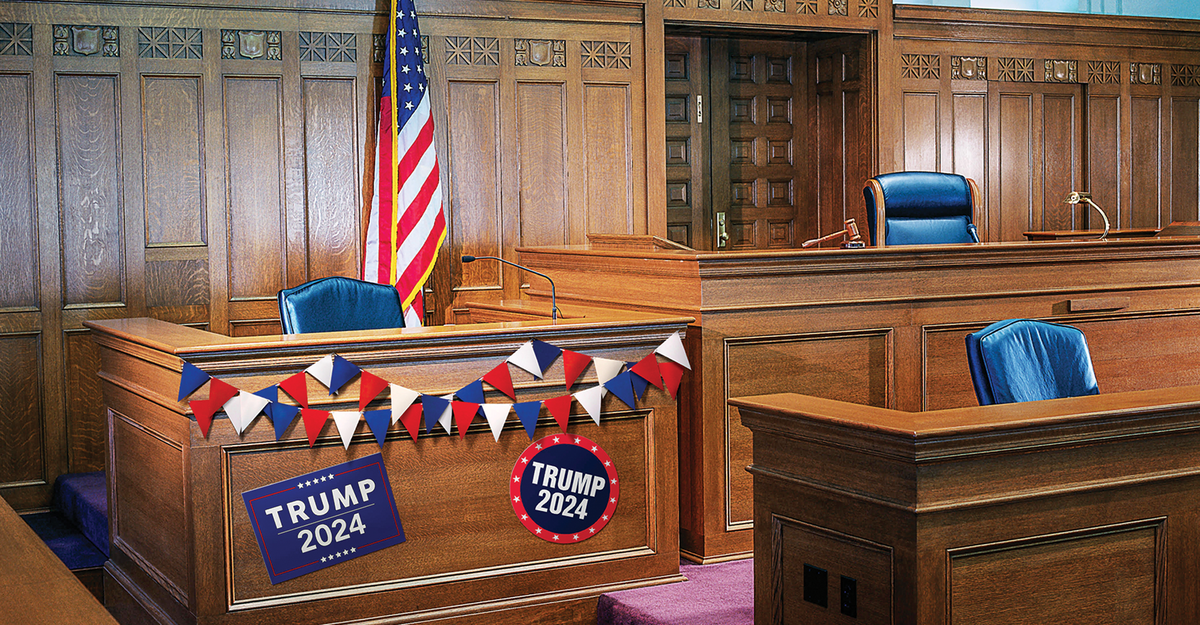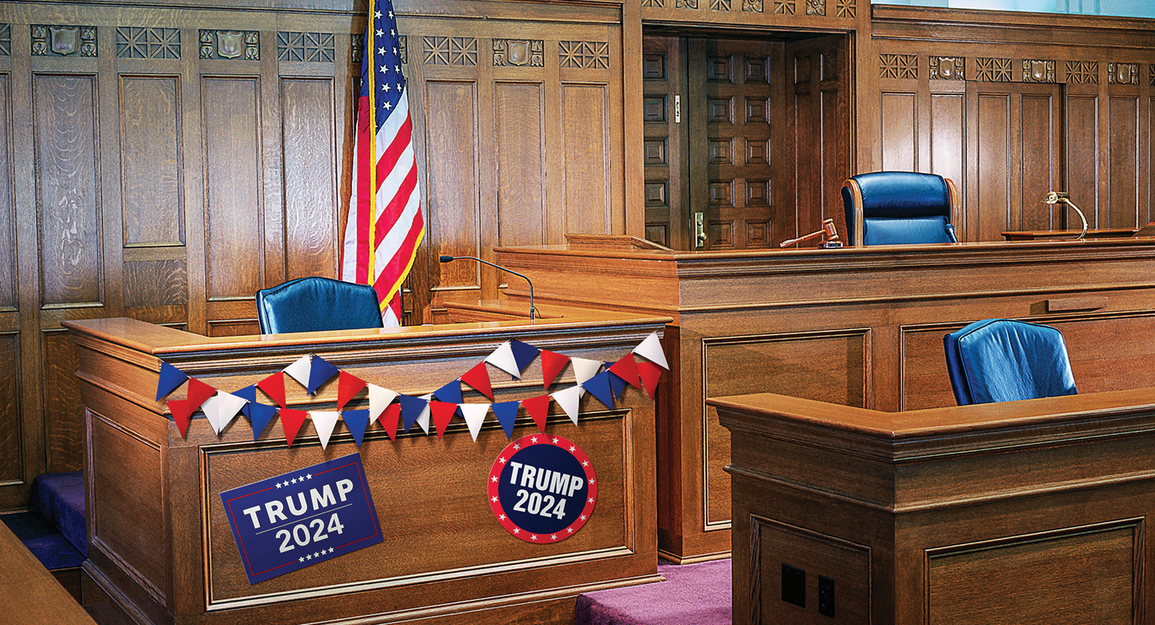
No one wants to appear before a judge as a criminal defendant. But court is a particularly inhospitable place for Donald Trump, who conceptualizes the value of truth only in terms of whether it is convenient to him. His approach to the world is paradigmatic of what the late philosopher Harry Frankfurt defined as bullshit: Trump doesn’t merely obscure the truth through strategic lies, but rather speaks “without any regard for how things really are.” This is at odds with the nature of law, a system carefully designed to evaluate arguments on the basis of something other than because I say so. The bullshitter is fundamentally, as Frankfurt writes, “trying to get away with something”—while law establishes meaning and imposes consequence.
The upcoming trials of Trump—in Manhattan; Atlanta; South Florida; and Washington, D.C.—will not be the first time he encounters this dynamic. His claims of 2020 election fraud floundered before judges, resulting in a series of almost unmitigated losses. In one ruling that censured and fined a team of Trump-aligned lawyers who had pursued spurious fraud allegations, a federal judge in Michigan made the point bluntly. “While there are many arenas—including print, television, and social media—where protestations, conjecture, and speculation may be advanced,” she wrote, “such expressions are neither permitted nor welcomed in a court of law.”
But only now is Trump himself appearing as a criminal defendant, stripped of the authority and protections of the presidency, before judges with the power to impose a prison sentence. The very first paragraph of the Georgia indictment marks this shift in power. Contrary to everything that Trump has tried so desperately to prove, the indictment asserts that “Trump lost the United States presidential election held on November 3, 2020”—and then actively sought to subvert it.
Although Trump loves to file lawsuits against those who have supposedly wronged him, the courtroom has never been his home turf. Records from depositions over the years show him to be sullen and impatient while under oath, like a middle schooler stuck in detention. Timothy L. O’Brien, a journalist whom Trump unsuccessfully sued for libel in 2006, recalled in Bloomberg that his lawyers forced Trump to acknowledge that he had lied over the years about a range of topics. Trump has seemed similarly ill at ease during his arraignments. When the magistrate judge presiding over his arraignment in the January 6 case asked whether he understood that the conditions of his release required that he commit no more crimes, he assented almost in a whisper.
All of this has been a cause for celebration among Trump’s opponents—because the charges against him are warranted and arguably overdue, but also for a different reason. The next year of American politics will be a twin drama unlike anything the nation has seen before, played out in the courtroom and on the campaign trail, often at the same time. Among Democrats, the potential interplay of these storylines has produced a profound hope: Judicial power, they anticipate, may scuttle Trump’s chances of retaking the presidency, and finally solve the political problem of Donald Trump once and for all.
It has become conventional wisdom that nothing can hurt Trump’s standing in the polls. But his legal jeopardy could, in fact, have political consequences. At least some proportion of Republicans and independents are already paying attention to Trump’s courtroom travails, and reassessing their prior beliefs. A recent report by the political-science collaborative Bright Line Watch found that, following the Mar-a-Lago classified-documents indictment in June, the number of voters in each group who believed that Trump had committed a crime in his handling of classified information jumped by 10 percentage points or more (to 25 and 46 percent, respectively).
And despite Trump’s effort to frame January 6 as an expression of mass discontent by the American people, the insurrection has never been popular: Extremist candidates who ran on a platform of election denial in the 2022 midterms performed remarkably poorly in swing states. Ongoing criminal proceedings that remind Americans again and again of Trump’s culpability for the insurrection—among his other alleged crimes—seem unlikely to boost his popularity with persuadable voters. If he appears diminished or uncertain in court, even the enthusiasm of the MAGA faithful might conceivably wane.
Above all of this looms the possibility of a conviction before Election Day, which has no doubt inspired many Democratic fantasies. If Trump is found guilty of any of the crimes of which he now stands accused, a recent poll shows, almost half of Republicans say they would not cast their vote for him.
But that outcome is only one possibility, and it does not appear to be the most likely.
Americans who oppose Trump—and, more to the point, who wish he would disappear as a political force—have repeatedly sought saviors in legal institutions. The early Trump years saw the lionization of Special Counsel Robert Mueller as a white knight and (bewilderingly) a sex symbol. Later, public affection turned toward the unassuming civil servants who testified against Trump during his first impeachment, projecting an old-school devotion to the truth that contrasted with Trump’s gleeful cynicism. Today, Mueller’s successors—particularly Special Counsel Jack Smith and Fulton County District Attorney Fani Willis, who is leading the Georgia prosecution—are the subjects of their own adoring memes and merchandise. One coffee mug available for purchase features Smith’s face and the text Somebody’s Gonna Get Jacked Up!
Perhaps this time will be different. With Trump out of office, Smith hasn’t been limited, as Mueller was, by the Justice Department’s internal guidance prohibiting the indictment of a sitting chief executive. Willis, a state prosecutor, operates outside the federal government’s constraints. And neither Bill Barr nor Republican senators can stand between Trump and a jury.
The indictments against Trump have unfolded in ascending order of moral and political importance. In April, the Manhattan district attorney, Alvin Bragg, announced charges for Trump’s alleged involvement in a hush-money scheme that began in advance of the 2016 election. In June came Smith’s indictment of Trump in Florida, over the ex-president’s hoarding of classified documents at Mar-a-Lago. Two months later, the special counsel unveiled charges against Trump for his attempts to overturn the 2020 election. Willis’s indictment in Georgia quickly followed, employing the state’s racketeering statute to allege a widespread scheme to subvert the vote in favor of Trump. (He has pleaded not guilty in the first three cases and, as of this writing, was awaiting arraignment in Georgia. The Trump campaign released a statement calling the latest indictment “bogus.”)
But each case has its own set of complexities. The New York one is weighed down by a puzzling backstory—of charges considered, not pursued, and finally taken up after all—that leaves Bragg’s office open to accusations of a politically motivated prosecution. The indictment in Florida seems relatively open-and-shut as a factual matter, but difficult to prosecute because it involves classified documents not meant to be widely shared, along with a jury pool that is relatively sympathetic to Trump and a judge who has already contorted the law in Trump’s favor. In the January 6 case, based in Washington, D.C., the sheer singularity of the insurrection means that the legal theories marshaled by the special counsel’s office are untested. The sweeping scope of the Georgia indictment—which involves 19 defendants and 41 criminal counts—may lead to practical headaches and delays as the case proceeds.
Trump’s army of lawyers will be ready to kick up dust and frustrate each prosecution. As of July, a political-action committee affiliated with Trump had spent about $40 million on legal fees to defend him and his allies. The strategy is clear: delay. Trump has promised to file a motion to move the January 6 proceedings out of Washington, worked regularly to stretch out ordinary deadlines in that case, and tried (unsuccessfully) to move the New York case from state to federal court. The longer Trump can draw out the proceedings, the more likely he is to make it through the Republican primaries and the general election without being dragged down by a conviction. At that point, a victorious Trump could simply wait until his inauguration, then demand that the Justice Department scrap the federal cases against him. Even if a conviction happens before Americans go to the polls, Trump is almost certain to appeal, hoping to strand any verdict in purgatory as voters decide whom to support.
Currently, the court schedule is set to coincide with the 2024 Republican primaries. The Manhattan trial, for now, is scheduled to begin in March. In the Mar-a-Lago case, Judge Aileen Cannon has set a May trial date—though the proceedings will likely be pushed back. In the January 6 case, Smith has asked for a lightning-fast trial date just after New Year’s; in Georgia, Willis has requested a trial date in early March. But still, what little time is left before next November is rapidly slipping away. In all likelihood, voters will have to decide how to cast their ballot before the trials conclude.
The pileup of four trials in multiple jurisdictions would be chaotic even if the defendant were not a skillful demagogue running for president. There’s no formal process through which judges and prosecutors can coordinate parallel trials, and that confusion could lead to scheduling mishaps and dueling prosecutorial strategies that risk undercutting one another. For instance, if a witness is granted immunity to testify against Trump in one case, then charged by a different prosecutor in another, their testimony in the first case might be used against them in the second, and so they might be reluctant to talk.
In each of the jurisdictions, defendants are generally required to sit in court during trial, though judges might make exceptions. This entirely ordinary restriction will, to some, look politically motivated if Trump is not allowed to skip out for campaign rallies, though conversely, Trump’s absence might not sit well with jurors who themselves may wish to be elsewhere. All in all, it may be hard to shake the appearance of a traveling legal circus.
Attacking the people responsible for holding him to account is one of Trump’s specialties. Throughout the course of their respective investigations, Trump has smeared Bragg (who is Black) as an “animal,” Willis (who is also Black) as “racist,” and Smith as “deranged.” Just days after the January 6 case was assigned to Judge Tanya Chutkan, Trump was already complaining on his social-media site, Truth Social, that “THERE IS NO WAY I CAN GET A FAIR TRIAL” with Chutkan presiding (in the January 6 cases she has handled, she has evinced little sympathy for the rioters). Anything that goes wrong for Trump during the proceedings seems destined to be the subject of a late-night Truth Social post or a wrathful digression from the rally stage.
However damning the cases against Trump, they will matter to voters only if they hear accurate accounts of them from a trusted news source. Following each of Trump’s indictments to date, Fox News has run segment after segment on his persecution. A New York Times /Siena College poll released in July, after the first two indictments, found that zero percent of Trump’s loyal MAGA base—about 37 percent of Republicans—believes he committed serious federal crimes.
And beyond the MAGA core? A recent CBS News poll showed that 59 percent of Americans and 83 percent of self-described non-MAGA Republicans believe the investigations and indictments against Trump are, at least in part, attempts to stop him politically. Trump and his surrogates will take every opportunity to stoke that belief, and the effect of those efforts must be balanced against the hits Trump will take from being on trial. Recent poll numbers show Trump running very close to President Joe Biden even after multiple indictments—a fairly astonishing achievement for someone who is credibly accused of attempting a coup against the government that he’s now campaigning to lead.
The law can do a great deal. But the justice system is only one institution of many, and it can’t be fully separated from the broader ecosystem of cultural and political pathologies that brought the country to this situation in the first place.
After Robert Mueller chose not to press for an indictment of Trump on obstruction charges, because of Justice Department guidance on presidential immunity, the liberal and center-right commentariat soured on the special counsel, declaring him to have failed. If some Americans now expect Fani Willis or Jack Smith to disappear the problem of Donald Trump—and the authoritarian movement he leads—they will very likely be disappointed once again. Which wouldn’t matter so much if serial disappointment in legal institutions—he just keeps getting away with it—didn’t encourage despair, cynicism, and nihilism. These are exactly the sentiments that autocrats hope to engender. They would be particularly dangerous attitudes during a second Trump term, when public outrage will be needed to galvanize civil servants to resist abuses of power—and they must be resisted.
Trump’s trials are perhaps best seen as one part of a much larger legal landscape. The Justice Department’s prosecutions of rioters who attacked the Capitol on January 6 seem to have held extremist groups back from attempting other riots or acts of mass intimidation, even though Trump has called for protests as his indictments have rained down. Michigan Attorney General Dana Nessel recently announced criminal charges alleging that more than a dozen Republicans acted as “fake electors” in an effort to steal the 2020 election for Trump—and as a result, would-be accomplices in Trump’s further plots may be less inclined to risk their own freedom to help the candidate out. Likewise, some of those lawyers who worked to overturn the 2020 vote have now been indicted in Georgia and face potential disbarment—which could cause other attorneys to hold back from future schemes.
This is a vision of accountability as deterrence, achieved piece by piece. Even if Trump wins a second term, these efforts will complicate his drive for absolute authority. And no matter the political fallout, the criminal prosecutions of Trump are themselves inherently valuable. When Trump’s opponents declare that “no one is above the law,” they’re asserting a bedrock principle of American society, and the very act of doing so helps keep that principle alive.
None of this settles what may happen on Election Day, of course, or in the days that follow. But nor would a conviction. If a majority of voters in a handful of swing states decide they want to elect a president convicted of serious state and federal crimes, the courts can’t prevent them from doing so.
Such a result would lead to perhaps the most exaggerated disjunction yet between American law and politics: the matter of what to do with a felonious chief executive. If federal charges are the problem, Trump seems certain to try to grant himself a pardon—a move that would raise constitutional questions left unsettled since Watergate. In the case of state-level conviction, though, President Trump would have no such power. Could it be that he might end up serving his second term from a Georgia prison?
The question isn’t absurd, and yet there’s no obvious answer to how that would work in practice. The best way of dealing with such a problem is as maddeningly, impossibly straightforward as it always has been: Don’t elect this man in the first place.
This article appears in the October 2023 print edition with the headline “Trump on Trial.” When you buy a book using a link on this page, we receive a commission. Thank you for supporting The Atlantic.



